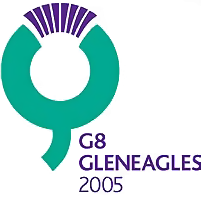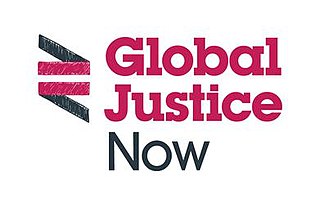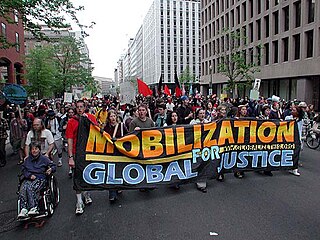Related Research Articles

Globalization or globalisation is the process of increasing interdependence and integration among the economies, markets, societies, and cultures of different countries worldwide. This is made possible by the reduction of barriers to international trade, the liberalization of capital movements, the development of transportation, and the advancement of information and communication technologies. The term globalization first appeared in the early 20th century, developed its current meaning sometime in the second half of the 20th century, and came into popular use in the 1990s to describe the unprecedented international connectivity of the post–Cold War world. Its origins can be traced back to 18th and 19th centuries due to advances in transportation and communications technology. This increase in global interactions has caused a growth in international trade and the exchange of ideas, beliefs, and culture. Globalization is primarily an economic process of interaction and integration that is associated with social and cultural aspects. However, disputes and international diplomacy are also large parts of the history of globalization, and of modern globalization.

The World Council of Churches (WCC) is a worldwide Christian inter-church organization founded in 1948 to work for the cause of ecumenism. Its full members today include the Assyrian Church of the East, the Oriental Orthodox Churches, most jurisdictions of the Eastern Orthodox Church, the Union of Utrecht, the Lutheran World Federation, the Anglican Communion, the Mennonite churches, the World Methodist Council, the Baptist World Alliance, the World Communion of Reformed Churches, the Pentecostal churches, the Moravian Church and the Malankara Mar Thoma Syrian Church. Notably, the Catholic Church is not a full member, although it sends delegates who have observer status to meetings.
Social justice is justice in relation to the distribution of wealth, opportunities, and privileges within a society where individuals' rights are recognized and protected. In Western and Asian cultures, the concept of social justice has often referred to the process of ensuring that individuals fulfill their societal roles and receive their due from society. In the current movements for social justice, the emphasis has been on the breaking of barriers for social mobility, the creation of safety nets, and economic justice. Social justice assigns rights and duties in the institutions of society, which enables people to receive the basic benefits and burdens of cooperation. The relevant institutions often include taxation, social insurance, public health, public school, public services, labor law and regulation of markets, to ensure distribution of wealth, and equal opportunity.

Woodcraft Folk is a UK-based educational movement for children and young people. Founded in 1925 and grown by volunteers, it has been a registered charity since 1965 and a registered company limited by guarantee since 2012. The constitutional object of this youth organisation is "to educate and empower young people to be able to participate actively in society, improving their lives and others' through active citizenship."

Interfaith dialogue, also known as interreligious dialogue, refers to cooperative, constructive, and positive interaction between people of different religious traditions and/or spiritual or humanistic beliefs, at both the individual and institutional levels.

Environmental justice is a social movement that addresses injustice that occurs when poor or marginalized communities are harmed by hazardous waste, resource extraction, and other land uses from which they do not benefit. The movement has generated hundreds of studies showing that exposure to environmental harm is inequitably distributed.

The 31st G8 summit was held on 6–8 July 2005 at the Gleneagles Hotel in Auchterarder, Scotland and hosted by Prime Minister Tony Blair. The locations of previous G8 summits to have been hosted by the UK include: London ; and Birmingham (1998). It is the first G8 summit to be held in Scotland. A sixth UK summit was held in Lough Erne in 2013; and a seventh UK summit was held in Carbis Bay in 2021.

Global Justice Now, formerly known as the World Development Movement (WDM), is a membership organisation based in the United Kingdom which campaigns on issues of global justice and development in the Global South.

The International Cooperative Alliance (ICA) is a non-governmental cooperative organization founded in 1895 to unite, represent and serve cooperatives worldwide. The ICA is the custodian of the internationally recognised definition, values and principles of a cooperative in the ICA Statement on the Cooperative Identity. The ICA represents 315 co-operative federation and organisations in 107 countries.
Community building is a field of practices directed toward the creation or enhancement of community among individuals within a regional area or with a common need or interest. It is often encompassed under the fields of community organizing, community organization, community work, and community development.

The Global Call to Action Against Poverty (GCAP) is a network of over 11,000 civil society organizations (CSOs) dedicated to social justice, established in 2005 during the World Social Forum in Porto Allegre. It represents approximately 58 national groups. It serves as a platform for individuals and organizations to unite against systemic factors perpetuating poverty and inequalities.
TransAfrica is an advocacy organization in Washington, D.C. that seeks to influence the foreign policy of the United States concerning African and Caribbean countries and all African diaspora groups. It is a research, education, and advocacy center for activism related to social, economic and political conditions in Africa, the Caribbean, and Latin America and other parts of the African Diaspora. TransAfrica is the largest and oldest social justice organization in the U.S that focuses on the African world. It has served as a major research, educational, and organizing institution for the African and African descendant communities and for the U.S. public in general.
The Coalition for the International Criminal Court (CICC) is an international network of NGOs, with a membership of over 2,500 organizations worldwide advocating for a fair, effective and independent International Criminal Court (ICC). Coalition NGO members work in partnership to strengthen international cooperation with the ICC; ensure that the court is fair, effective and independent; make justice both visible and universal, and advance stronger national laws that deliver justice to victims of war crimes, crimes against humanity and genocide. The CICC Secretariat is hosted by the Women's Initiative for Gender Justice and it is based in The Hague.
The Lausanne Committee for World Evangelization, more commonly known as the Lausanne Movement, is a global movement that mobilizes Christian leaders to collaborate for world evangelization. The movement's fourfold vision is to see 'the gospel for every person, disciple-making churches for every people and place, Christ-like leaders for every church and sector, and kingdom impact in every sphere of society'.

Environmental issues are disruptions in the usual function of ecosystems. Further, these issues can be caused by humans or they can be natural. These issues are considered serious when the ecosystem cannot recover in the present situation, and catastrophic if the ecosystem is projected to certainly collapse.
The World Justice Project (WJP) is an international civil society organization with the stated mission of "working to advance the rule of law around the world". It produces the World Justice Project Rule of Law Index, a quantitative assessment tool that shows the extent to which countries adhere to the rule of law in practice. WJP's major activity is the World Justice Forum, a global gathering at which prominent leaders from all parts of the world and a variety of disciplines come together to articulate how the rule of law affects their disciplines and regions and to develop collaborative actions to strengthen the rule of law.

The anti-globalization movement, or counter-globalization movement, is a social movement critical of economic globalization. The movement is also commonly referred to as the global justice movement, alter-globalization movement, anti-globalist movement, anti-corporate globalization movement, or movement against neoliberal globalization. There are many definitions of anti-globalization.

The global justice movement is a network of globalized social movements demanding global justice by opposing what is often known as the “corporate globalization” and promoting equal distribution of economic resources.

The People's Climate March (PCM) was a large-scale activist event orchestrated by the People's Climate Movement to advocate global action against climate change, which took place on Sunday, September 21, 2014, in New York City, along with a series of companion actions worldwide, many of which also took the name People's Climate March. With an estimated 311,000 participants, the New York event was the largest climate change march in history. Described as "an invitation to change everything," the march was called in May 2014 by the global advocacy human rights group Avaaz and 350.org, the environmental organization founded by writer/activist Bill McKibben, and it was endorsed by "over 1,500 organizations, including many international and national unions, churches, schools and community and environmental justice organizations." It was conceived as a response to the scheduled U.N. Climate Summit of world leaders to take place in New York City two days later, on September 23.

Global Goals Week is a shared commitment between a coalition of over 160 partners across all industries, which mobilizes annually in September to bring together communities, demand urgency, and supercharge solutions for the Sustainable Development Goals (SDGs). It was founded in 2016 by the United Nations Foundation, Project Everyone, and the United Nations Development Programme (UNDP). It is timed to coincide with the UN General Assembly "High-Level Week" in New York. The week includes events, summits, conferences, forums, workshops, pledges, and other activations in New York, around the world, and online. It usually runs alongside Climate Week NYC, the annual conference of Goalkeepers, Bloomberg Global Business Forum and many other high-level events.
References
- ↑ "One World Week - Working together for a just peaceful and sustainable world". www.oneworldweek.org. Retrieved 2019-06-05.